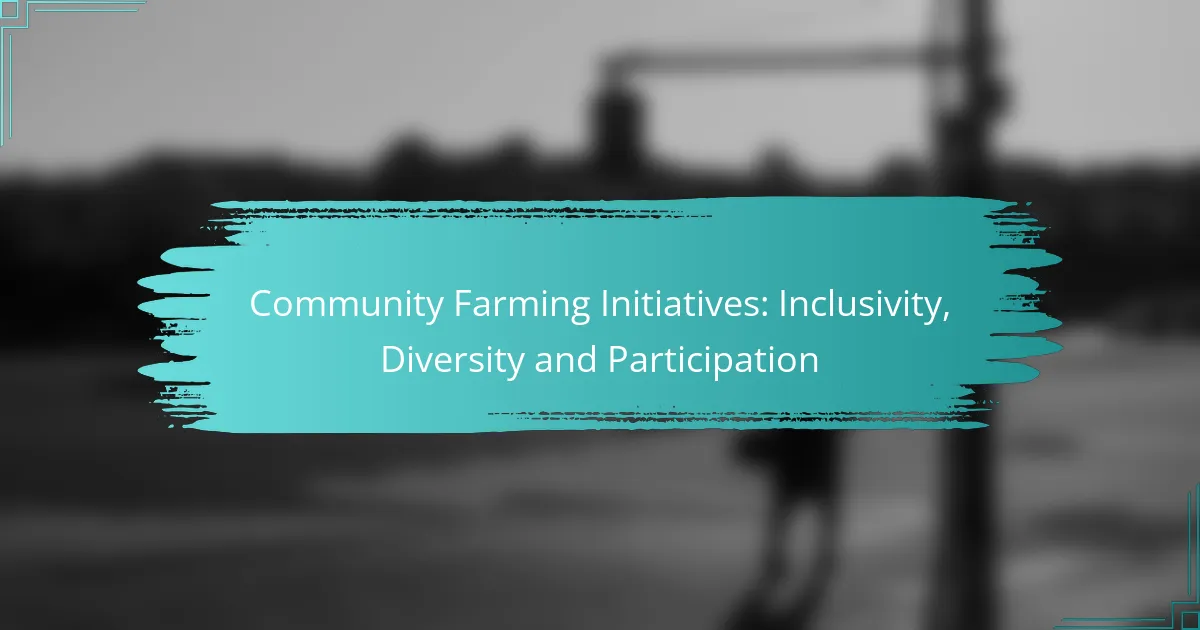Community farming initiatives play a vital role in promoting inclusivity and diversity by engaging individuals from various backgrounds in agricultural practices. These programs not only break down barriers to access but also enhance crop resilience and social connections through the exchange of diverse perspectives. By participating in cooperatives, volunteering, or attending educational events, community members can contribute to a shared purpose and strengthen their local bonds.

How do community farming initiatives promote inclusivity?
Community farming initiatives promote inclusivity by actively involving diverse groups in agricultural practices, ensuring that everyone has a voice and opportunity to participate. These programs aim to break down barriers, making farming accessible to all community members regardless of their background or experience.
Engaging diverse community members
Engaging diverse community members is essential for the success of community farming initiatives. This can be achieved through outreach programs that target various demographic groups, including different ethnicities, ages, and socioeconomic backgrounds. Workshops and events that celebrate cultural diversity can help foster a sense of belonging and encourage participation.
For example, hosting multilingual workshops can attract non-native speakers, while family-friendly events can draw in parents and children. Creating a welcoming environment where all voices are heard enhances community cohesion and encourages ongoing involvement.
Creating accessible farming programs
Creating accessible farming programs involves designing activities that cater to varying skill levels and physical abilities. This can include raised garden beds for individuals with mobility challenges or beginner classes for those new to farming. Providing necessary tools and resources at little or no cost can further lower barriers to entry.
Additionally, offering flexible scheduling for workshops and volunteer opportunities can accommodate different work and life commitments. Ensuring that programs are affordable or supported by local grants can help attract participants from low-income households.
Fostering collaboration among local groups
Fostering collaboration among local groups is crucial for building a strong community farming network. Partnerships with schools, non-profits, and local businesses can enhance resources and reach a broader audience. These collaborations can lead to shared events, funding opportunities, and access to expertise.
For instance, a local school might partner with a community farm to create educational programs that teach students about sustainable agriculture. Such initiatives not only benefit the farm but also enrich the community’s educational landscape, promoting a culture of cooperation and shared goals.

What are the benefits of diversity in community farming?
Diversity in community farming brings numerous advantages, including improved crop resilience and a richer exchange of knowledge. By incorporating varied perspectives and practices, communities can enhance their agricultural output and foster stronger social connections.
Enhanced crop variety and resilience
Diverse farming practices lead to a wider range of crops, which can significantly improve resilience against pests and diseases. For instance, planting a mix of heirloom and hybrid varieties can reduce the risk of total crop failure due to environmental stressors.
Additionally, diverse crops can contribute to soil health and biodiversity. Farmers can rotate crops and interplant species to create a more balanced ecosystem, which often results in better yields over time.
Broader skill sets and knowledge sharing
Community farming initiatives that embrace diversity allow for a richer exchange of skills and knowledge among participants. Individuals from different backgrounds bring unique agricultural techniques and cultural practices, enhancing the overall expertise of the group.
Workshops and collaborative projects can facilitate this sharing, where experienced farmers teach newcomers about organic practices, pest management, or crop rotation. This collective learning environment fosters innovation and adaptability in farming methods.
Strengthened community bonds
Diversity in community farming fosters stronger social ties among participants. Working together on shared goals creates a sense of belonging and mutual support, which is vital for community cohesion.
Regular gatherings, such as harvest festivals or planting days, can further enhance these bonds. These events not only celebrate the fruits of labor but also encourage collaboration and friendship among diverse groups, leading to a more resilient community overall.

How can individuals participate in community farming initiatives?
Individuals can engage in community farming initiatives through various avenues that promote inclusivity and diversity. Participation can take the form of joining cooperatives, volunteering in gardens, or attending educational events, all of which foster a sense of community and shared purpose.
Joining local farming cooperatives
Joining a local farming cooperative allows individuals to collaborate with others in growing food and sharing resources. These cooperatives often operate on a membership basis, where members contribute labor and share in the harvest, making it a cost-effective way to access fresh produce.
Cooperatives can vary in structure, from small neighborhood groups to larger organizations. When considering joining, look for cooperatives that align with your values, such as organic practices or community support. Many cooperatives also offer training and resources for new members.
Volunteering for community gardens
Volunteering in community gardens is a hands-on way to participate in local agriculture. These gardens often welcome volunteers to help with planting, maintenance, and harvesting, providing a great opportunity to learn about sustainable practices while connecting with neighbors.
To find community gardens in your area, check local government websites or social media groups dedicated to gardening. Many gardens have specific volunteer days or events, so it’s beneficial to stay informed about their schedules and needs.
Attending workshops and events
Attending workshops and events related to community farming can enhance your knowledge and skills. These gatherings often cover topics such as organic gardening, permaculture, and food preservation, catering to various skill levels and interests.
Look for workshops hosted by local agricultural organizations, universities, or community centers. Many events are free or have a nominal fee, making them accessible. Participating in these activities not only builds your expertise but also expands your network within the community.

What role do local governments play in supporting community farming?
Local governments play a crucial role in supporting community farming by providing essential resources, implementing favorable policies, and ensuring access to land. Their involvement can significantly enhance the sustainability and inclusivity of these initiatives.
Providing funding and resources
Local governments can allocate funding to community farming initiatives through grants, subsidies, or direct financial support. This funding can cover costs such as seeds, tools, and educational programs, making it easier for communities to start and maintain their farms.
Additionally, resources like training workshops and access to agricultural experts can be provided to help community members develop their farming skills. Such support fosters a knowledgeable community that can effectively manage and sustain farming projects.
Implementing supportive policies
Supportive policies from local governments can create a favorable environment for community farming. This includes zoning laws that allow for agricultural activities in urban areas and regulations that facilitate the establishment of community gardens.
Moreover, policies that promote food security and sustainability can encourage community participation. Local governments can also create incentives for businesses and organizations to collaborate with community farms, enhancing their reach and impact.
Facilitating land access
Access to land is a critical factor for successful community farming. Local governments can facilitate this by identifying underutilized public land that can be transformed into community gardens or farms. They may also offer long-term leases at affordable rates to community groups.
In some cases, local governments can assist in negotiating land-use agreements with private landowners, ensuring that community farms have the necessary space to thrive. This approach not only supports agricultural initiatives but also strengthens community ties and promotes local food systems.

What are successful examples of community farming initiatives?
Successful community farming initiatives foster inclusivity, diversity, and participation by engaging local residents in sustainable agriculture practices. These projects often focus on education, food security, and community building, showcasing how collaborative efforts can lead to thriving urban farms.
Brooklyn Grange in New York
Brooklyn Grange operates rooftop farms across New York City, emphasizing local food production and community engagement. With over two acres of cultivated land, it provides fresh produce to local restaurants and markets while hosting educational programs for residents.
The initiative encourages participation through volunteer days and workshops, allowing community members to learn about urban agriculture. This hands-on approach fosters a sense of ownership and connection to the food system.
Urban Roots in Austin
Urban Roots focuses on empowering young people through farming and food education in Austin, Texas. The program trains teens in sustainable farming practices while supplying fresh produce to local food pantries and restaurants.
By involving youth in meaningful work, Urban Roots not only addresses food insecurity but also cultivates leadership skills and community awareness. Participants often report increased confidence and a deeper understanding of nutrition and environmental stewardship.
Growing Power in Milwaukee
Growing Power is a nonprofit organization that promotes urban agriculture and food justice in Milwaukee, Wisconsin. It operates community gardens and farms, providing access to fresh, healthy food in underserved neighborhoods.
This initiative emphasizes the importance of local food systems and offers training programs for aspiring farmers. Growing Power also advocates for policy changes to support urban agriculture, ensuring that community voices are heard in discussions about food access and sustainability.

What challenges do community farming initiatives face?
Community farming initiatives encounter several challenges that can hinder their effectiveness and sustainability. Key issues include funding limitations, regulatory hurdles, and the need for inclusivity and diversity among participants.
Funding limitations
Funding limitations are a significant barrier for community farming initiatives, affecting their ability to acquire land, resources, and necessary infrastructure. Many projects rely on grants, donations, or local government support, which can be inconsistent or insufficient.
To navigate funding challenges, community farms should explore diverse funding sources, such as crowdfunding, local business sponsorships, and partnerships with non-profit organizations. Establishing a clear budget and demonstrating the social benefits of the initiative can help attract potential funders.
Additionally, applying for grants from agricultural or community development programs can provide financial support. It’s essential to stay informed about local funding opportunities and to build relationships with stakeholders who can assist in securing resources.
